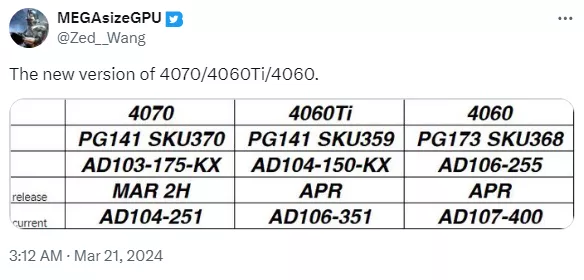Rumor mill: Starting this spring, consumers purchasing mid-range RTX 40 series graphics cards could receive units running on down-binned chips from higher-end wafers. While their official specifications and performance will remain unchanged compared to earlier products with the same label, minor variations in clocks or efficiency could emerge.
For those unfamiliar, down-binning is when manufacturers use partially disabled chips in products of lower performance and lower cost than what they were originally fabricated for. Defective processors emerge from factories fairly often, but instead of discarding them, manufacturers sort them for components whose standards they successfully meet. This practice helps chipmakers conserve significant amounts of inventory and maintain acceptable yield levels.
Known leaker MEGAsizeGPU recently posted a chart indicating that new versions of the Nvidia GeForce RTX 4070, RTX 4060 Ti, and RTX 4060 will begin shipping over the next few weeks. While users likely won’t notice any significant differences from units purchased at launch, the revisions will use down-binned processors from higher-end models.

Down-binned chips aren’t clearly labeled, resulting in a sort of lottery where a user buying a mid-range or low-end processor might receive a high-end chip that failed its original trial. Performance typically adheres to the official specifications of the listed product, but lucky consumers might encounter processors that maintain unusually low temperatures or handle overclocking surprisingly well.
According to the leak, 4070 boards with AD103 GPUs begin shipping this month. Since there’s only one week left in March, they may already be in the wild. The 4070 and 4070 Ti officially use the AD104, whereas AD103 chips that meet their full specifications end up in the RTX 4070 Ti Super, RTX 4080, RTX 4080 Super, and the laptop RTX 4090.
Also read: What is Chip Binning?
From there, the down-binning has a domino effect impacting the 4060 Ti and 4060. Starting in April, 4060 Ti cards will be sold with the AD104 instead of their usual AD106, and 4060 units will begin appearing with partially disabled AD106 chips instead of the AD107.
Because the specs on the box will remain unchanged for each product, they will maintain their old prices. Partner boards for the 4070 currently start at around $520, the 4060 Ti at around $400, and the 4060 at just below $300. The change doesn’t affect the RTX 4070 Super, which launched in January and took over the 4070’s old $599 MSRP with a respectable performance upgrade.

